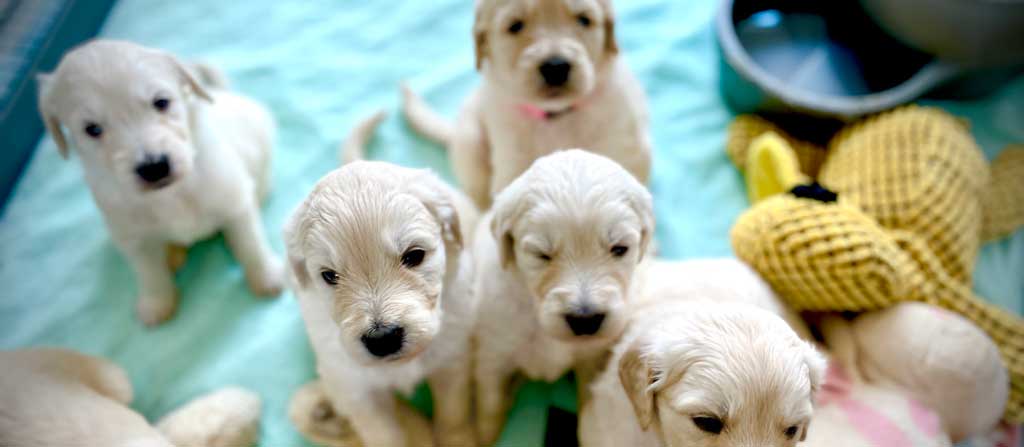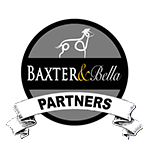
Britannia Farms 8 week Puppy Program
When you purchase a Britannia Farms puppy, you are not just getting a cute fluffy little pup. We use every day of the 8 weeks they are with us to prepare them in any way we can for their new lives ahead in our big world. Puppies are sponges. They absorb from every sense they have everything around them. We, as responsible breeders can take advantage of these opportunities and introduce them to as many stimuli, experiences and challenges as we can. This will shape their confidence in this new world, and with your help and training, bring them to their full potential as our faithful companions.
Our 8 week program based upon proven methods, along with untold hours of love and socialization has gone into each and every puppy. We believe this puts each puppy at a distinct advantage, and on a path to great things.
Here is an outline of our program.
Early Neurological Stimulation – ENS
It started with The U.S. Military’s canine program, known as the “Super Dog” Program. Used to improve the performance of dogs used for military purposes, “Bio Sensor” program was developed. This was based on years of research, and showed that neurological stimulation exercises could have important and lasting effects. Carried out from the third day of life until the sixteenth day, during a short period of rapid neurological growth and development.
The puppies that were on this program were observed to have the following physiological benefits:
- Improved cardio vascular performance (heart rate)
- Stronger heart beats
- Stronger adrenal glands
- More tolerance to stress
- Greater resistance to disease
Early Scent Introduction – ESI
During this same early life time frame of 3-16 days, whilst performing ENS on the puppies, we will be introducing “Early Scent Introduction – ESI”. A dog’s ability to smell is a function of their intellect. The area of the brain that processes data picked up by the nose is 40 times larger in dogs than humans, and their noses are 10,000 to 100,000 times more sensitive to smells than our human noses.
What does this mean for your puppy?
A few of our Britannia Farms puppies have gone on to become successful Service Dogs. Many have become Therapy Dogs, and all, great Companion Dogs. These scent abilities are very important. Early exposure to scent, and encouraging the development of this vital function can lead to dogs that do better in these fields of service.
As an example, one of our Service Dogs-in-training was able to alert to a sleeping family member having a potentially deadly low blood sugar seizure. He was only a young puppy. All the other family members were asleep, and he raised the alarm, saving her life.
If dogs can follow the scent of one of their humans, imagine a companion dog to a child with Autism that wanders off? Or a companion dog that could convey to you that there was a strange smell of smoke or gas in the house? They have potential to save lives. This skill is enhanced by Early Scent Introduction “ESI”.
Sound Desensitization
Did you know puppies are born deaf? Hearing is the last sense to fully develop, and they start to hear things around them at 3 weeks of age. At this time we introduce the puppies to sounds and noises that they can expect to hear in their new lives with you.
This sound desensitization allows the puppy to be aware gradually of many different noises while they are young, before a ‘fear period’ could easily create an unnatural fear of that noise or stimulation. Examples would be thunderstorms and fireworks, traffic and construction noises. Daily desensitizations also include babies crying, doors slamming, doorbells, dogs barking and rain.
We start on low volume when the puppies are comfortable and listening. We repeat often, increasing the volume with new sounds added daily. In addition to this as our puppies are raised in our home they are already exposed to the sound of everyday noises like the vacuum cleaner, food blender, TV and music.
Around 3-4 weeks of age, we expose the puppies to a controlled loud sound like dropping a metal bowl or a large book. This evokes a normal reflex of ‘startle and recover’ (a fast, involuntary reaction followed by a fast recovery to normal).This allows them to know how to deal with something loud and unexpected. This is done at this age so as not to evoke the fear response (which is a sustained emotional response).
General daily handling exercises
In order to get your puppy used to frequent common handling that will occur in daily life, we have to start young. After ENS has concluded, we continue with the daily handling of the puppies, increasing time and frequency, and adding in other exercises.
Touching of foot pads and toes, and tapping of toenails prepares puppy for vet examinations, toenail trims and cleaning/wiping off feet after being outside.
Running fingers around the neck/collar area prepares puppy for taking on and off collar and leash, and being comfortable with being restrained by the collar during training.
Rubbing ears and tail, preparing them for petting and vet examinations. The same with opening their mouths and running fingers along gums and lips. Your vet will thank you!
Included with all of these exercises is lots of cuddling and love. Every day we pick out puppies for cuddle sessions, and hold them close to our heart to feel our heart beat, and our faces to feel our breath. This is so important! What better job could anyone want?
Introduction to Potty Training
Puppies around the 3 weeks of age begin to be aware of the need to potty. They instinctively move away from where they feed and sleep to do this. This is the exact reason that Crate Training works so well. And the exact reason we choose now to begin this process. We provide a litter box for them to use, and show them how to get there. Repeating this many times over a week to 10 days pays off and they then use the litter box, keeping their area clean. At 5-6 weeks puppies start having outside play time (weather allowing), at first on the turf play area and then onto the real grass on the bigger play area. As soon as they get outside and their feet get onto the ‘grass’ they start to potty! Encouraging this sequence of exposure to outside pottying sets up the habit, and makes potty training, along with the help of Crate Training easier.
Crates and novel experiences
Crates are a fact of life for puppies. They are the most effective way to potty train your puppy, and keep them safe at the same time when you can’t have eyes on them. They are den animals and will likely learn to love their crate, seeing it as a safe place to rest, and get some time out.
We start around 5-6 weeks with the introduction of crates in their pen. We allow them to go in and out at will, wanting them to have good experiences. We often find a couple of pups in there taking a nap with some plush toys they took in.
Every day we give the puppies a ‘novel’ item or experience. One day it may be an umbrella opening and closing or balloons bobbing above them. Another it may be blowing bubbles or a big cardboard box to climb on and hide in. We try to repeat some of these important exercises to allow curiosity but not develop fear. We dress up with a ‘Darth Vader’ type welding mask, big coats, scarfs and different hats so they have that experience in a fun and safe space. They very much like the big crinkly dog food bag. Until it starts to get shredded! New people (friends and family) visit and hold them – new voices and smells to get to know.
Challenges get their curiosity and they learn to persevere if the answer is not immediately there. Putting food on the other side of a gate so they learn to go around. Sometimes it takes a couple of tries, but they have to problem solve.
Stairs are another problem to solve. It takes some fine tuning of motor skills and coordination to master the task. They are very intelligent, and learn so fast.
We often post the fun we have through photos and videos on or Facebook and Instagram pages. We are proud of what we do and want to share their progress with you.
Preparation for new owners
You may be a seasoned dog owner, or this may be your first puppy. Either way, we want you to be as prepared as you can possibly be when you take your ball of fluff home. Britannia Farms will be in contact with you at least weekly from the birth of your puppy to the day you pick them up. We know the 8 week wait is long, and it helps to have little progress updates and photos. We will send you advice and direction on such subjects as vaccinations, training, grooming pet insurance and nutrition. We are always available for questions.
Britannia Farms hopes that you see the value of a puppy that has so much time, experience and love invested in them. Our Puppy Program strives for excellence. We want our puppies to experience the very best of life and learning in the short time we have them.




